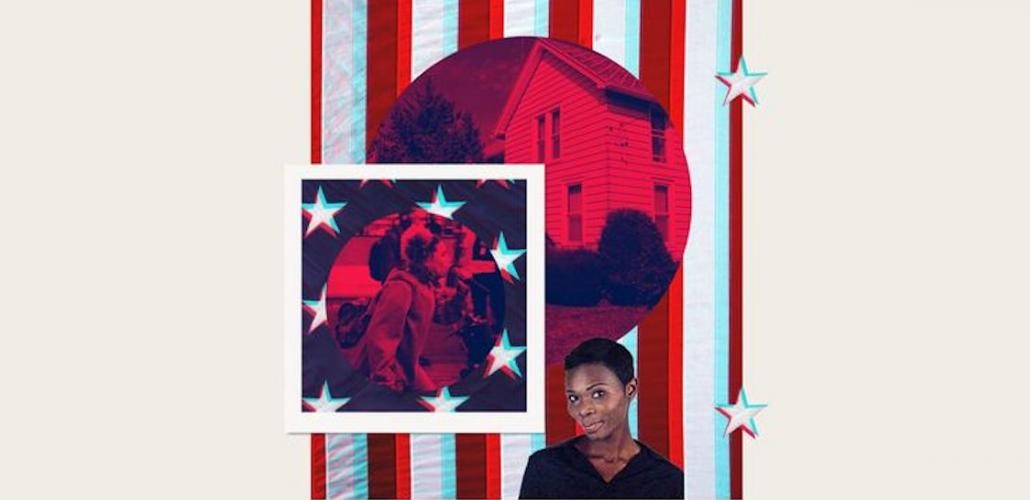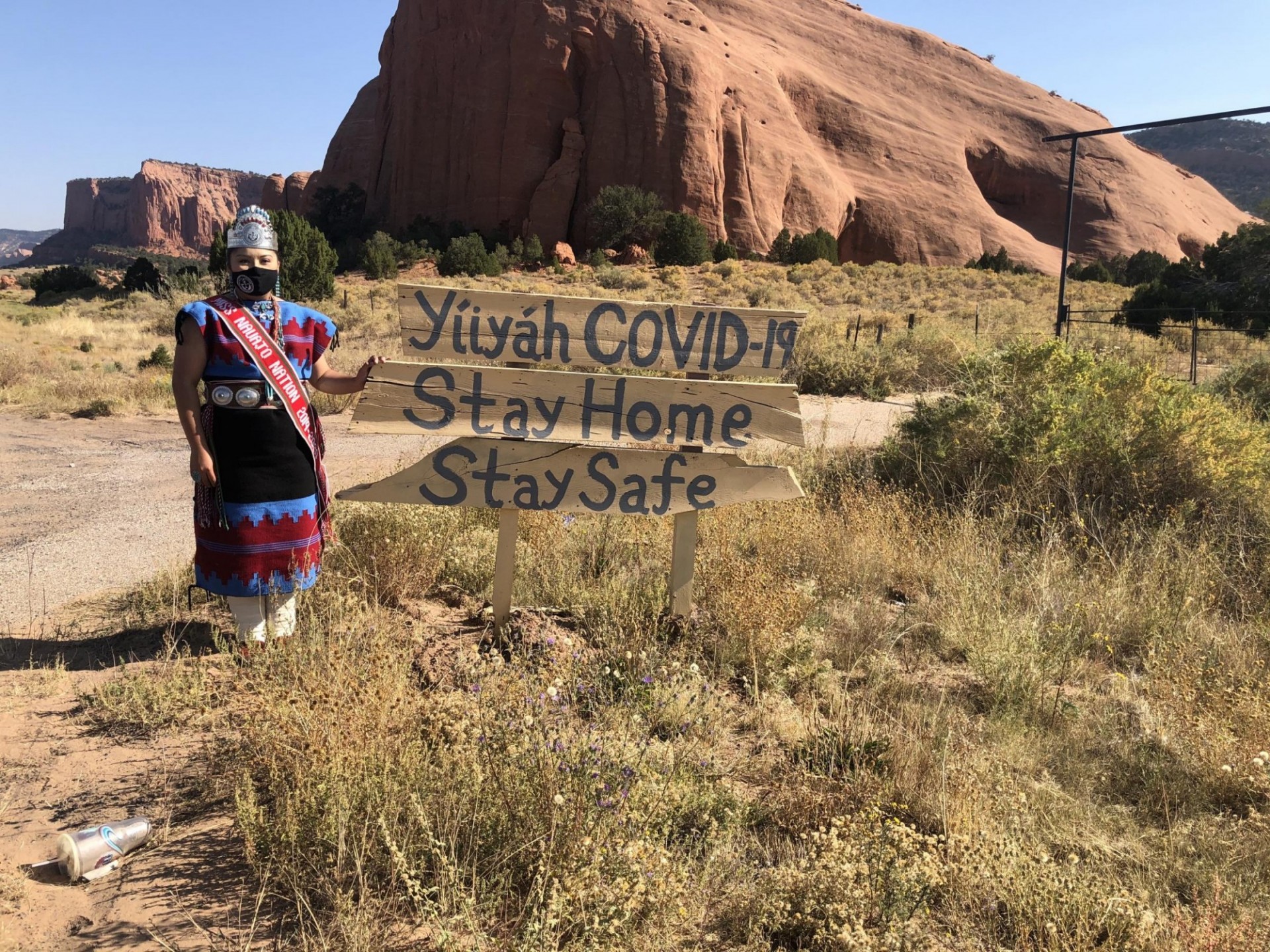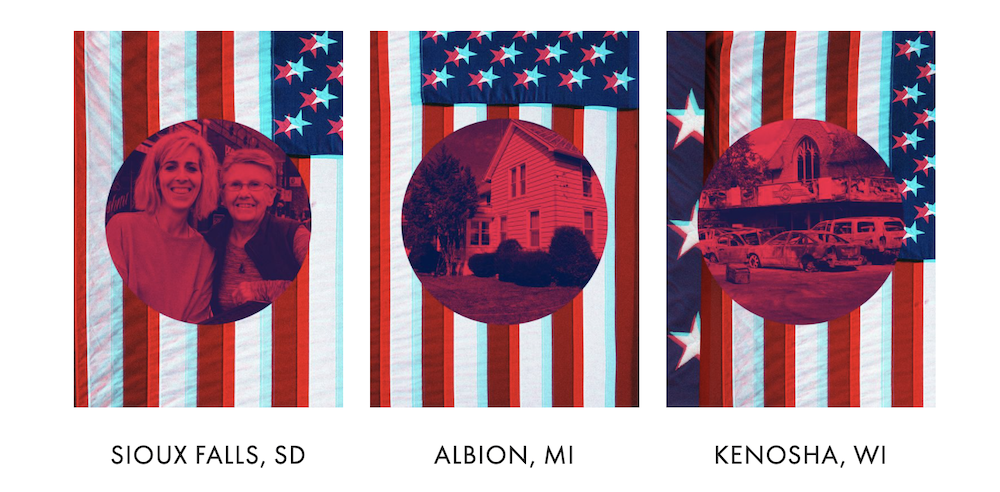Pulitzer Traveling Fellowship Recipient Rita Omokha, ‘20 M.S., on Documenting Marginalized Voices During America’s Moment of Reckoning, Part 2
In the second part of our Q&A with Rita Omokha, '20 M.S., she expands on what she uncovered as she interviewed unheard voices and communities of color across the country for "America Redefined." Read the first part of the Q&A here.
This interview was conducted in December 2020.

Q: As a Black woman born outside the U.S., did you find the stories you heard on your journey changed your understanding of what it means to be Black in America?
I uncovered firsthand what I always suspected: My lived experiences, as a Black immigrant, are vastly different than that of Black Americans when it came to how I’ve interacted within the system over the years. Largely because of being raised in a Nigerian home, a Nigerian bubble while in America, with a different history, a different outlook and generational insights. For example, we weren’t raised with this idea that America inflicted pain on us specifically as say, a Black American who for generations the stories of cruelty from slavery onward was always present. That idea of "we are born oppressed" is how most engage with America. That a system they were born into didn’t see them more than, perhaps this reimagination of slaves. Or, less than. And so, among other things, I was always intentional to ask people of color, Black America, "Have you had any experience where you explicitly felt that way? Experiences with police officers? When was the earliest experience?"
There were instances I would walk away from conversations in deep reflection for days, just processing: How am I to digest any of this?
One man in Kenosha (link is external), Isiah Washington, told me that at seven years old, while in front of a school one evening, playing with his cousin, he had his first encounter with a police officer: gun drawn on them both. At seven? That is not my lived experience. Think about the trauma that caused him. When you think about why Black people tend to be so angry, so upset with the system, that's why. From the time Black Americans were children, they were told they don't matter, they were told they're criminals, they were told that there's a school-to-prison pipeline waiting for them. Growing up, my mom somehow isolated us in our Nigerian bubble, full of maxims on hard work, faith, and all of that, which protected us for some time.
Another story from Memphis comes to mind. Dr. Justin Dodson returned home after getting his Ph.D. His first week back, he was pulled over by cops while walking down the street with a friend, another Black man. The cops asked for IDs, asked what they were doing, before letting them go. Dr. Dodson tried to justify the random stop to himself: Could it have been the ripped-style jeans he had on? All this man wanted to do was walk around with agency and purpose, but he was stripped of that. He also mentioned that in his current work counseling young Black men, one of his clients recently told him, "I don't know a Black person who hasn't been touched up by a police officer." That right there is emblematic of America and the experiences of Black people in this country.
Q: You visited the Navajo Nation. What did you find there?
Shaandiin Parrish — who works directly with their President (they are sovereign from America), Jonathan Nez, in her role as Miss Navajo Nation — took me around to the different communities on the Arizona side. The Navajo Nation spans New Mexico and Arizona. One of the issues she walked me through and took me to are the landfills. When we hear landfills, we think climate change, methane levels, because it’s a danger to our present and future environment and health. This is a major issue for them, especially since a large number of their population are the elderly. The landfills haven’t been cleaned in years. She mentioned that they are now working with the U.S. government on clean-up efforts and long term solutions.

The other pressing issue this past year was the increased number of Indigenous women being killed and not traced. For the first time in decades, the American government created an FBI task force to investigate these deaths. She said that's been a big win working with the Trump administration, and she feels it will continue with the Biden administration. She also mentioned that America at large doesn't know enough, or care enough, about the Native American population, that Americans have this feeling that they are extinct. She said, "We're very much here, and we're very much part of the larger story of America."
Q: Do you see any hope for the future?
Not right now. Racism is a systemic issue that has long been embedded within every facet of this country. Centuries on centuries, and we’re still so backward. When something is permeating within an institution and those benefiting from that clear injustice do nothing, it tells me I don't have any power. We, those marginalized, start out powerless in this system. We fight and fight and fight, and yet nothing. It’s up to white America to step up because people of color did not create this mess. White America holds the power in how we move forward as a nation.
I can’t have hope right now because I haven’t seen a glimpse of hope. We keep dying and nothing changes. People post, like and retweet, but what does that do? Police keep killing us with impunity. And then they get to go home and see their families and have dinner with them, tuck their kids in at night, all after stealing a life? None of it makes sense.
It feels as though we’re headed to a very dark and even more divided place, a place where white supremacists are more emboldened than ever before.
Q: Where would you say this experience has left you?
It feels as though we’re headed to a very dark and even more divided place, a place where white supremacists are more emboldened than ever before. We’ve been putting so many band-aids on all these accumulated deep wounds that it’s going to get to a point where it’d end in irrecoverable harm. We are now used to Benjamin Crump coming on our screens, reciting the same condemnation at the system. At the police. And at all the injustices. And it's like, Oh well, the cycle continues. And it feels like we're now okay with: There goes Mr. Crump and another shattered Black family. Just another day in America, people. And now, there’s Trumpism to contend with. It’s all scary and exhausting.
This trip revived a stronger sense of urgency, to desperately do more for marginalized communities, for my people: To let us know that even though America may not see or accept us — for who we are, as we are — we can’t let that impede our progress. We need to keep fighting and continue to make conscious efforts to equip future generations. That’s why that Portland protest really hit me. Those teens should not be out there fighting like that. Tirelessly, you know? They should be thinking about homework, college, who they want to become, and those sorts of things. Not, Oh, if I make one wrong gesture I could very well die at the hands of police. That idea of dying at the hands of police is forever imprinted in who they are. That is so wild to me.
Because we have someone competent and experienced in the government of our yesteryears coming into office, people are sighing in relief. I’m not. We lived through this during the Obama years (link is external), through the Bush years (link is external). It goes deeper than the presidency. The system of America fosters and has always fostered white supremacy. It’s the everyday people out in the small towns and big cities and all across this nation that can really determine how far we progress as a nation. The government can only do so much. If the white majority are not willing to change, nothing will change in our everyday lives. Nothing will ever truly change in America. It’ll just be band-aid after band-aid.
If the white majority are not willing to change, nothing will change in our everyday lives. Nothing will ever truly change in America.
Q: What helped you in covering such a physical and emotional marathon of a story?
One practical thing that comes to mind is what Professor Goldman taught in his Covering Religion seminar: having "objective empathy." That's something I tapped into throughout this trip. What that means to me is being able to see things from someone else's perspective without any judgment.
It sounds simplistic in theory, but it can be a bit complex in practice because no one is truly objective. Even when we think we are, our lived experiences inform how we see the world. So, when I consciously practice objective empathy and try to understand why someone is the way they are, it makes me a better person, a better reporter. It pushes me to authentically honor people’s stories, who they are, their lived experiences. That becomes all the more important when their views are a bit extreme. There were instances I would walk away from conversations in deep reflection for days, just processing: How am I to digest any of this? That was a slap to my face as a Black person. But I’d always remember objective empathy. It’s a conscious choice you must make and be mindful of.
I'm grateful for that seminar and for my experience at Columbia. Professors Paula Span, Samuel Freedman and Gregory Khalil also come to mind. They were instrumental in really investing time in my growth from the beginning — in a way, I carried all their lessons with me.

I’m also grateful for the support of Ryan D'Agostino, the editorial director at Hearst Magazines (the parent company of ELLE). Since I was introduced to him in March, through a separate pitch, he’s been a champion and mentor. When I brought this brainchild to him, he immediately saw its significance and urgency. After the year of reckoning officially sprung following George Floyd, people started talking about allyship nonstop. Hashtagging it all over the place, doing TikToks and Instagram stories on what it meant to them, to their institutions, tips on becoming one; it felt performative and blindly reactive. To me, Ryan was one before it became this must-have badge or social media marker. That says a lot.
So, knowing I was equipped and championed in different ways fueled me — it was powerful sustenance for my mind. I tend to guard my mind a ton because I think you don’t really see with your eyes, you see and become with your mind. Our minds control everything, who we are, how we present, what drives us. And once you’ve got your mind secured, the rest is easy. That really helped me on this journey.
Q: What do you hope will come out of this project?
Doing this project at such a difficult time for the country, my hope is that people walk away with a meaningful understanding about those othered in America: what their racial experiences are, how they viewed 2020, and their hope for the future — if they had any.
When you’re limited to the radius of your community, your town, your neighborhood — all the familiar things — you're in a bubble. We develop tunnel vision in our bubbles. I hope that the different accounts expand people’s attitudes and serve as a glimpse into those marginalized in society and how they’ve coped in this moment of reckoning. I hope it furthers the conversation on race in America, deepening people’s understanding of the different plights and perspectives.